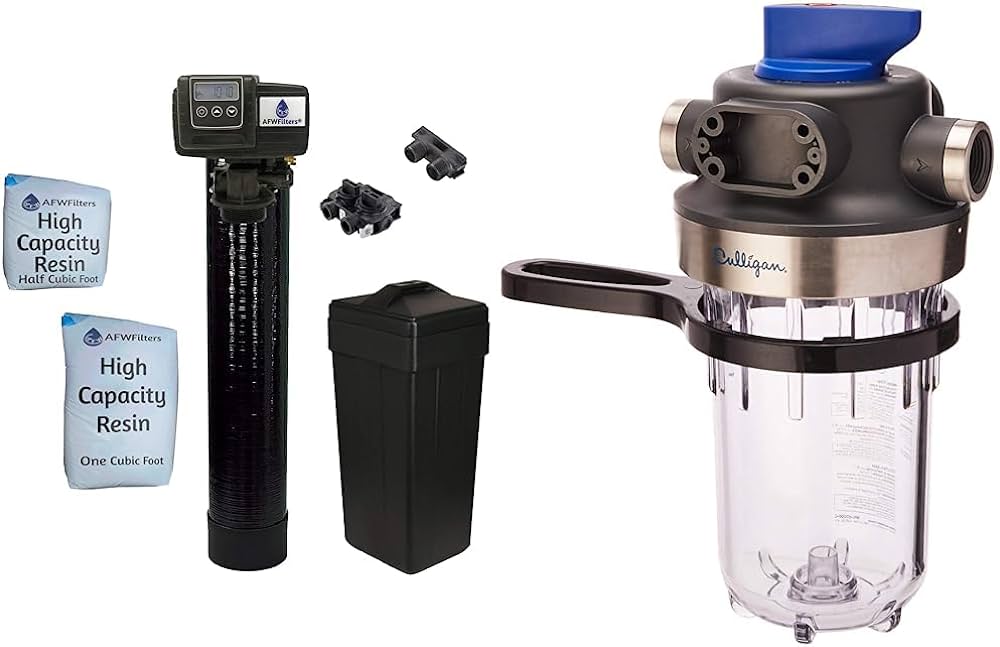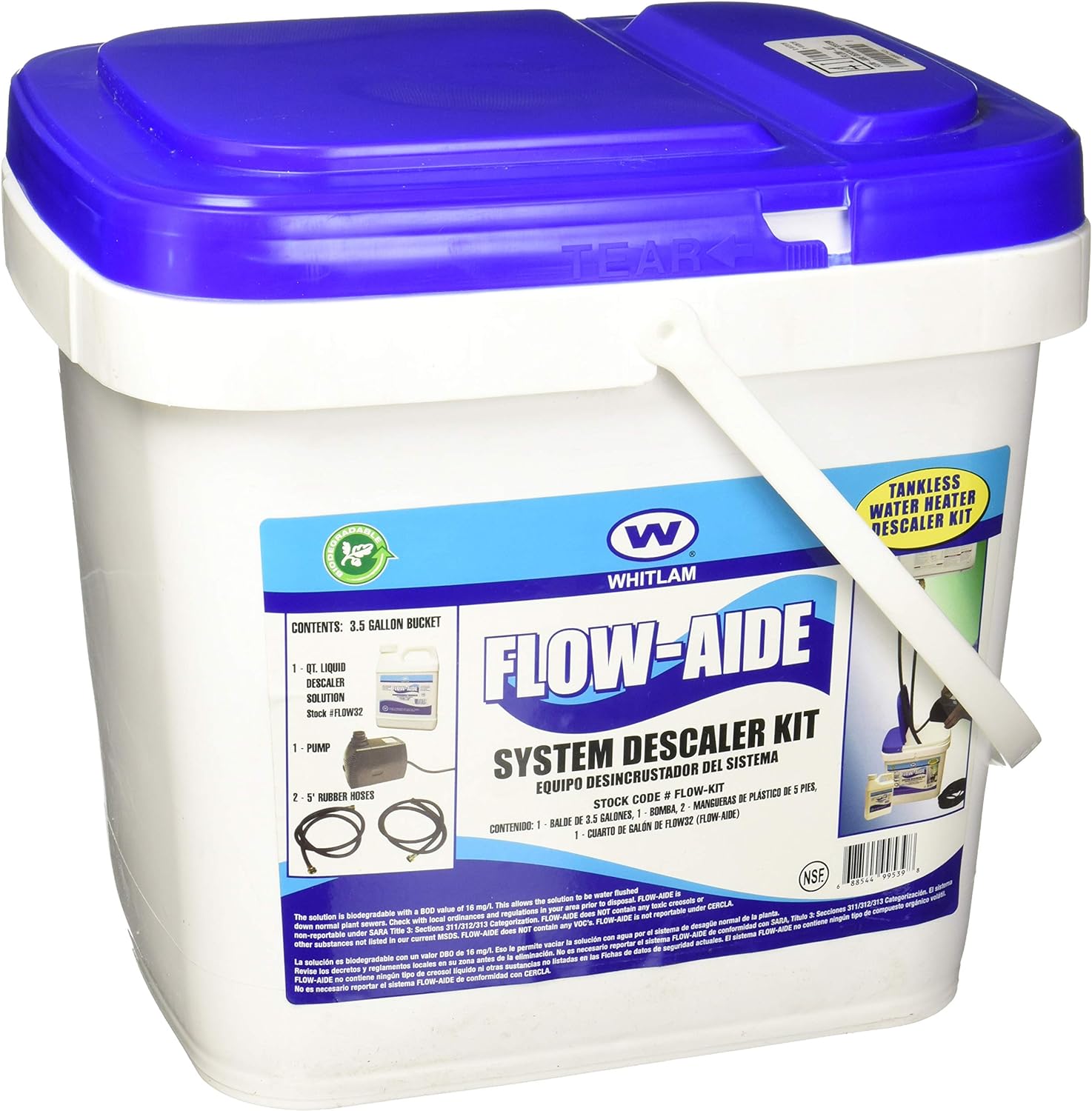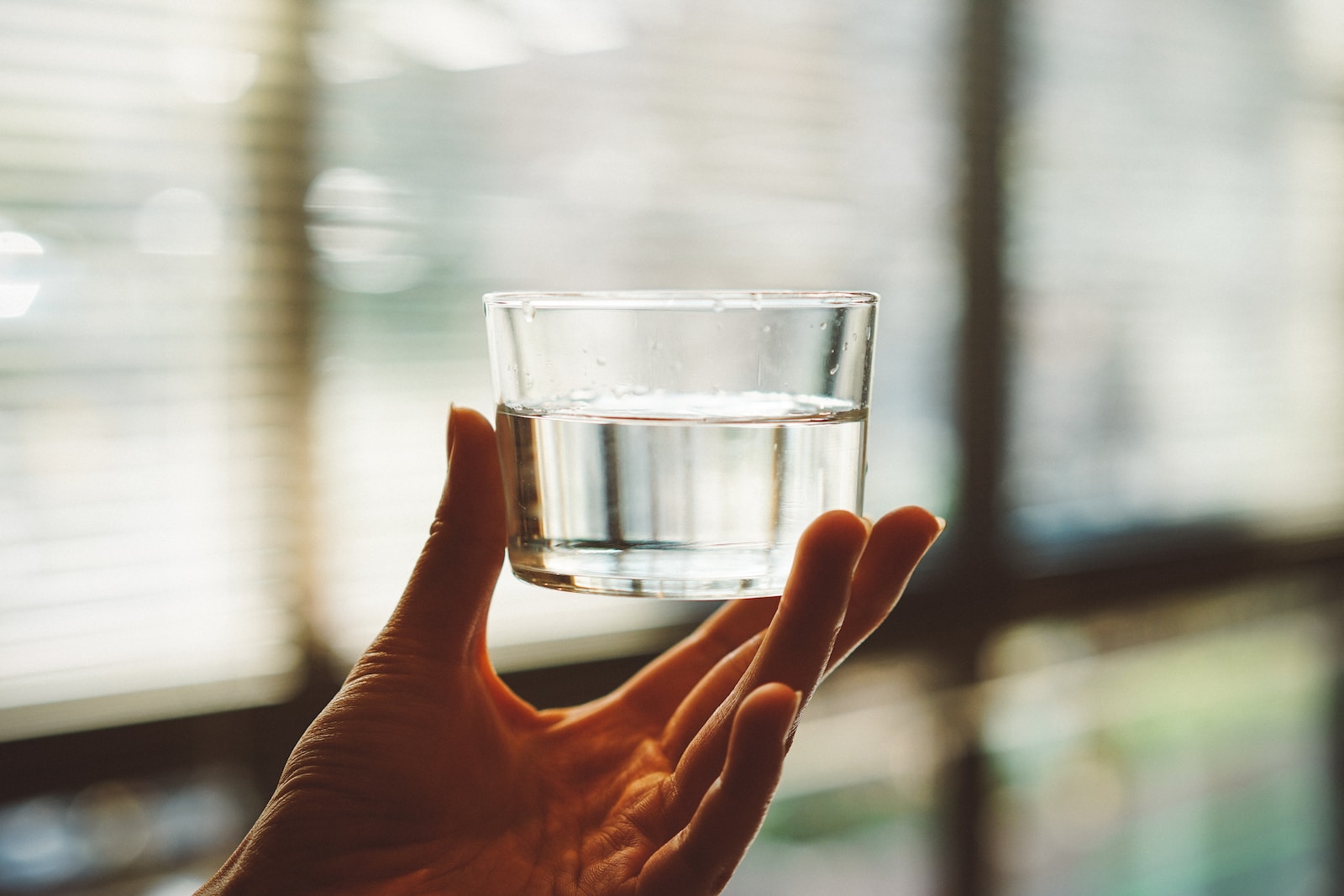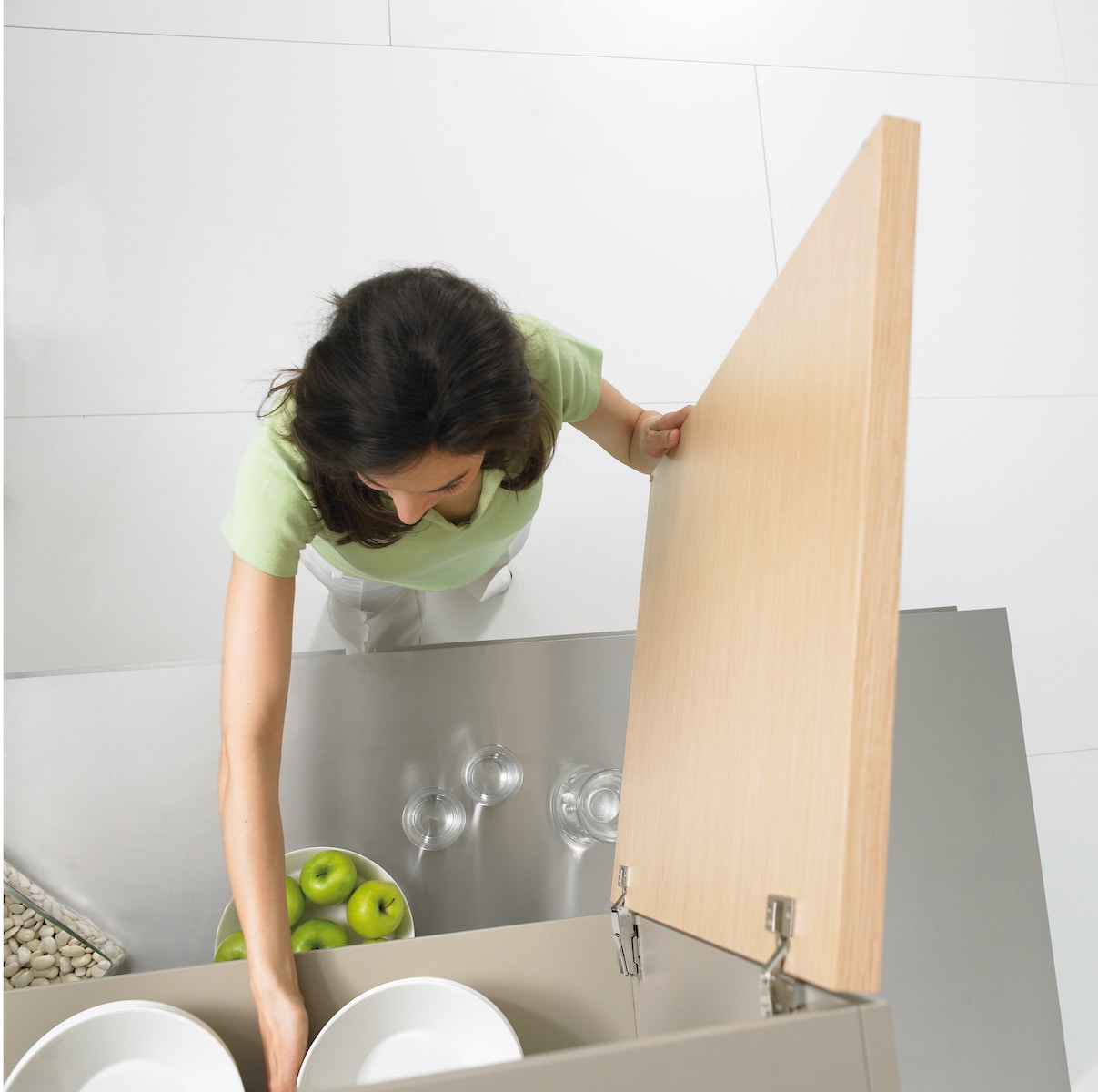Tankless Water Heater Descaler vs Vinegar: Which is Better?
Purchasing products via the links in our article may result in us earning a commission, but rest assured, this does not influence our editorial independence.
If your hot water’s getting a little lackluster, chances are limescale is the sneaky culprit. Ugh, that sneaky white stuff loves clogging up the works! But don’t worry, descaling is the answer. Let’s break down your two trusty weapons – vinegar and commercial descaler – so you can give that tankless water heater a good cleaning!
Key Takeaways:
- Hard water = limescale buildup. This buildup hurts efficiency, costs you money, and can damage your heater.
- Descaling is your heater’s best friend. Clean regularly – the frequency depends on how hard your water is.
- Vinegar: the natural warrior. Cheap, effective for lighter buildup.
- Commercial descaler: the heavy hitter. Faster, stronger – perfect for serious limescale.
- The right choice is yours! Consider buildup severity, comfort with chemicals, and your budget.
- Your heater’s manual is the key. It tells you exactly what to use and how to do it safely.
Descaling 101: What the Heck Is It?
Think of descaling like giving your water heater a deep-cleaning spa day. We’re getting rid of those pesky mineral deposits (aka limescale) that hang out inside your system. Where’d they come from? Your water! This is especially true if you’ve got hard water. To get a sense of how hard your water is, take a peek at this map from the USGS.
Why Bother Descaling Water Heater?
- Hot Water for the Win: Get that strong water flow and perfect temperature back.
- Money Saver: Think of it like this: a clean heater is a happy heater, and a happy heater keeps your energy bills lower!
- Longevity: It’s like changing the oil in your car – descaling helps your heater last longer and avoid a breakdown (because cold showers are the WORST).
Vinegar vs. Commercial Descaler: Clash of the Cleaners
Okay, so tankless heaters are rockstars for that endless hot water. But just like us, they need some TLC. Descaling is the key, and you’ve got a couple of paths to victory:
Vinegar: The Kitchen Hero
Ah, vinegar! That acidic wonder is like limescale’s worst nightmare. Why folks love it:
- Cheap!: You probably have some under the sink already.
- Earth-friendly: Vinegar won’t leave behind any funky chemicals.
- The Easy Option: No need to go hunting for specialty products.
A Few Things to Keep in Mind:
- Might Need Elbow Grease: Vinegar is a bit milder, so if you’ve got serious buildup, it might need extra cleaning time.
- That Smell: Some folks don’t love vinegar’s strong scent.
Snag some white vinegar on Amazon if you need.
Commercial Descaler: The Heavy Hitter
These bad boys are built for one thing – obliterating limescale FAST! Here’s the scoop:
- Maximum Power: They pack a stronger punch with special acids, tackling even the toughest buildup.
- Made for the Job: Formulas designed specifically for those tankless heaters.
- Less Stinky: Many are way less harsh-smelling than vinegar.
What’s the Catch?
- More Coins: They’ll cost a bit more than your kitchen vinegar.
- Safety Gear: Some have chemicals, so handle with care.
If you want the heavy-duty stuff, here are some popular choices:
Oh, and if you go the commercial route, a cool flushing kit like this Superior Pump 91660 Descaler Pump Kit makes the job a whole lot easier.
The Ultimate Showdown: So, Which Do I Choose?!?
Here’s the deal: it depends on a few things:
- Buildup Battle: Mild case? Vinegar might do the trick. Serious limescale situation? It’s commercial descaler time.
- Your Comfort Zone: If stronger chemicals make you nervous, vinegar’s your pal.
- Budget Boss: Vinegar wins if you’re watching those pennies.
Important Stuff (Because I Don’t Want Your Heater Exploding! 😉)
- Manual Mania: Your heater’s manual is your BFF, like this one from Rinnai. It’ll tell you exactly what to do and what products are safe.
- Safety First: Gloves and eye protection are a must, especially with commercial descalers.
- Regular Cleaning for the Win: Think of it like brushing your teeth – consistent prevention is key! Descale once a year, maybe more often if your water’s really hard.
How to Descale a Tankless Water Heater
Remember, friends: Before you get groovin’, shut off the heater’s power and water supply. And don’t forget to check your owner’s manual – it’s the ultimate guide for your specific model.
Safety Checklist
- Rubber Gloves: Protecting your hands from vinegar or those stronger descaling chemicals.
- Face Mask: Avoid breathing in strong fumes – keep that nose happy!
- Safety Glasses: No one wants limescale gunk in their eyes!
- Buckets: To catch all that cleaning solution.
- Flush Kit: Makes the whole process super easy. It usually includes a pump, hoses, and a bucket.
Descaling with Vinegar: The Natural Avenger
- Mix It Up: Equal parts white vinegar and water – it’s like a cleaning potion!
- Cut It Off: Close those water valves to your heater and hook up the hoses to those special ports. An image here would be super helpful – visuals are my jam!
- Let’s Circulate!: Run your vinegar solution through the heater via the cold water inlet, kinda like a supercharged shower, for about an hour.
- The Grand Flush: Disconnect those hoses, open those valves, and let the clean water do its thing for a good 15 minutes. This is super important to get rid of any lingering vinegar taste.
- Back in Action: Restore water and power – time to test out those toasty temps!
Descaling with Commercial Descaler: The Big Guns
- Follow the Rules: Each product’s got its own directions, so follow them carefully.
- Dilute and Circulate: Dilute that descaler and run it through just like you did the vinegar. Be sure to check the instructions for how long.
- Flush, Flush, Flush!: Same idea here – disconnect those hoses, open the valves, and let fresh water rinse everything out for at least 15 minutes.
- Hook It Back Up: Power and water, back on! Let’s get that hot water flowing.
Craving a video walkthrough? Check this one out:
DIY or Pro? The Descaling Decision
Tankless heaters rock, but descaling…that can be tricky! Should you tackle it yourself, or bring in the plumbing pros?
DIY Descaling: When It Makes Sense
- Mild Mess: Limescale not too crazy, and you’re handy with basic plumbing? Give it a go!
- Manual Master: You love following directions to the letter. That heater manual is your friend.
- Budget Boss: Want to save money? DIY descaling is usually way cheaper.
Call in the Pros: When It’s the Smart Move
- Limescale Fortress: Buildup looks like it needs a jackhammer? Call the pros with the right tools.
- Spaceship Heater: Yours looks super complex? A pro can make sure nothing goes kaboom.
- Warranty Worries: Some warranties need pro cleaning – play it safe!
- Feeling Unsure?: No shame in getting help! Plumbers know their stuff.
The Limescale Prevention Squad: Softeners and Conditioners
Okay, so descaling those tankless heaters is necessary, but what if we could make limescale less of a problem in the first place? That’s where water softeners and conditioners step in, like your appliances’ personal bodyguards!
Water Softeners: Mineral-Busting Machines
These amazing systems take the bad guys (calcium and magnesium – aka the minerals that cause hard water) right outta the whole house’s water supply. No more minerals mean no more limescale buildup – it’s like magic for your tankless heater and all your other appliances.
Water Conditioners: The Sly Scientists
These guys are a bit trickier. They don’t actually remove the minerals, but they change ’em around so they don’t stick to your tankless heater and cause limescale trouble. Think of it like giving those minerals slippery shoes – they can’t hang around to create a mess!
The Pros of Going Soft (or Conditioned)
- Long-Term Defense: Say goodbye to frequent descaling sessions!
- Appliance Army Protection: Not just your water heater, your whole plumbing system gets the VIP treatment.
- Upgrade That Water!: Softened or conditioned water can taste better and feel nicer on your skin and hair. Bonus!
A Few Things to Consider
- Price Tag: These systems cost a bit more than a jug of vinegar or descaler.
- Gotta Keep ’em Clean: Softeners and conditioners need some regular TLC and supplies (like salt) to keep working their best.
Do They Replace Descaling?
Not exactly. If you’ve already got some serious limescale partying in there, you’ll still need a good descaling session to clear things out. But think of a softener or conditioner as a way to make sure that party doesn’t happen again anytime soon!
Frequently Asked Questions (Because I Know You’ve Got ‘Em!)
Once a year’s the usual deal, but check your manual and think about how hard your water is. Hard water? You might need to descale more often
Weak water flow, weird temperatures, or funny heater noises? It’s a sign that limescale is getting a little too comfy in there.
Stick with vinegar or official descalers. You don’t want to risk messing up your heater with something too harsh
Absolutely, as long as you’ve flushed everything out nice and clean.
Final Words of Wisdom
How you tackle limescale depends on what you’re feeling. Both vinegar and commercial descaler get the job done. The most important thing is doing this at least once a year – it’ll keep your tankless water heater running like a rockstar! And hey, if you get stuck, don’t be afraid to call in a pro for backup.
Sarah Johnson
Sarah Johnson is a home appliance expert with over 10 years of experience in the field. She has a deep understanding of descaling solutions and the importance of maintaining home appliances. She has a passion for helping others keep their appliances in top condition through her writing








